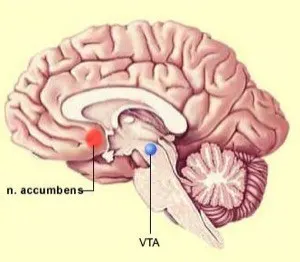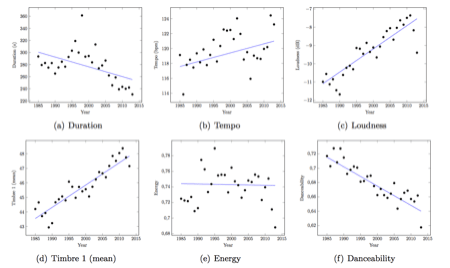The mental_floss magazine tasked John Green of their List Show to compile 25 Facts About the Science of Music…
He went above and beyond to make sure these were actually surprising, amazing, and conversation-inducing. Check out the 10 minute video below or scroll down for our TL;DR version:
While won’t suck all the life out of the video above because it deserves a watch, we’ll cut everyone some slack and give a super summary since the video is just under 10 minutes long. Ain’t nobody got time for that! (I’ll regret typing that 5 years from now when that meme is forgotten).
25 Music Facts Backed by Science!
I’m keeping these in order so you know where to find each fact in the video if you want to know more, but I’m chopping some of them out! If you want to know what the others are, then you’ll just have to watch the video.
1) Catchiest Song of All Time
Researchers created a game in 2014 called “Hooked on Music” that featured the biggest pop hits from the 1940’s till the present. The most catchiest song of all by far is The Spice Girl’s Wannabe, which users only needed 2.3 seconds to identify. The average was 5 seconds!

Honorary mentions are #2, Mambo Number Five by Lou Bega, and #3, Eye of the Tiger by Survivor.
2) A Certain Genre Makes People More Generous
Another study in 2014 made listeners play a game in which they were a dictator handing out rations to their citizens. The control group didn’t listen to any music while two experimental groups listen to either music they disliked or “chill-inducing” music. Those who heard the chill songs were far more generous than the other groups.
3) Music Gives a Certain Type of Person Chills & Goosebumbs
On the temperance scale, those who were more open to experience and expression were found to not only listen to and therefore encounter more types of music, but were those who subjectively received the most value from it. It’s these people who frequently experience chills and goosebumps from moving music than others!
4) Music Simulates Reward by Releasing Dopamine in the Brain

When we enjoy positive times such as eating, making love, or getting lit and jumping off something, we get a rush of dopamine that provides the sense of pleasure. It’s been found that music heightens activity in the nucleus accumbens area of the brain that regulates dopamine release.
No wonder we can’t get kids to take those dang headphones off!
6) Unborn Babies Hear & React to Music
Some maniacal scientist lady surgically inserted a microphone into pregnant women’s wombs to measure two things: If music played outside of the womb could be heard inside of it and if the fetus’ heart rate was affected by it. The answer was… yes and yes! Whether or not that means the babies enjoy it or hate it is undeterminable.
7) Premature Newborns Benefit from Hearing Lullabies
272 premature newborns were split up in 2013 and some listened to lullabies while others heard nothing or Satanic Thrash Metal… okay, I made that part up. But the babies who listened to lullabies showed slower heart rates and an increased caloric intake! Their moods were likely enhanced and their sense of comfort increased.
8) Listening to Music Decreases Anxiety & Boosts Immunity
This factoid comes out of a meta-research study (meaning someone collected data from about 400 other pieces of research, meaning an untold amount of money was wasted on something everyone already knows).
It boiled down to overwhelming evidence that pleasurable music reduces anxiety and boosts the immune systems of adults. We told you guys about the scientifically most relaxing song ever!
9) Classical Music Fans & Heavy Metal Fans Are Alike
In 2008 psychological data was collected globally from classical fans and fans of heavy metal. It turns out there are some similarities between the two groups. They are both highly creative, extremely gentle, and confidently self-assured.

Liberate tuteme ex inferis!
10) Non-Musicians Almost Rarely Hear Music in Dreams
Music in dreams is rare even for musicians. Studies have reported that only about 40% of musicians hear music in their sleep. For non-musicians that number is only 18%… Too bad, so sad! More reason to learn music theory and an instrument.
18) Your Parents’ Music is Better Than Yours
Unless you’re like me and listen to the older stuff, there’s no point in arguing with your parents about your music choices sucking. They do.
Studies analyzing pop music decade after decade show a gradual decrease in the number of notes, chords, keys, changes, vocabulary, topics, and moods. It’s almost as if the industry giants have learned that making music as generic and impulse-reacting as possible makes the kiddies cough up their cash quicker and more often.
19) Pop Music is So Predicable That Computers Can Write It
Mathematicians hit the laboratory to study and modularize pop music so it could be contained within a computer algorithm. The end result?
Computers can now not only write pop music as good as any of the industry songwriters but they can also add elements that increase the chance for it to become the next hit based on the copy-cat trends that occur.

Computers writing music? This totally explains why Dubsteb is a thing now.
25) Music Trends Might Affect the Stock Market
This is one of those “correlation isn’t causation” things, but researchers found that trends in the tempo of the top 100 songs since 1958 up to 2007 relate to the S&P 500 for the same years. They found that calming, slower, simpler music always trends before volatility occurs in the stock market…
That means the next time R&B pops off you better think about liquidating!
Fill in the gaps by watching the video and make sure you share this with your friends using the social media buttons below!